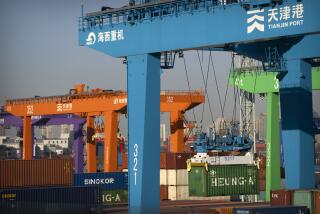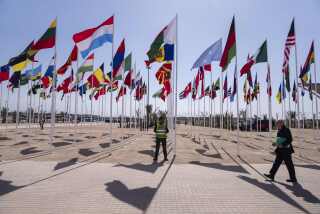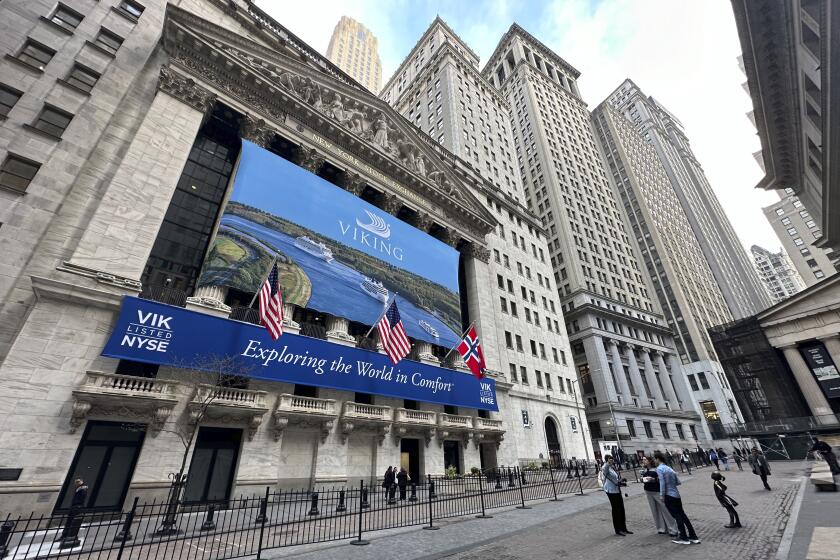World Officials Press for Economic Cure
With financial markets sliding throughout the world, the world’s leading economic officials continued seeking a prescription Monday to cure the economic malaise that started in Asia, spread to Russia, is bearing down on Latin America and ultimately threatens the United States.
U.S. officials worked on a bailout for Brazil’s besieged economy, and President Clinton called on Japan to press ahead with efforts to overhaul its financial system.
“Every leading industrial economy has a role to play, including the United States,” by providing aid to the International Monetary Fund, and Japan “by moving quickly to address its economic and financial challenges,” Clinton told financial officials from 22 advanced and emerging economies.
At one point Monday, the Dow Jones industrial average had plummeted some 232 points, although at the close the Dow had recovered all but 58 points of its decline.
U.S. stocks’ erratic performance followed another harrowing day abroad. Asian markets in particular plunged, with Japanese stocks falling to their lowest point in more than 12 years.
Monday’s continued market turmoil was widely interpreted as a vote of no confidence in the vague pledge offered over the weekend by the Group of 7 leading industrial nations.
U.S. Treasury Secretary Robert E. Rubin and the finance ministers of the other six nations said they would explore a variety of approaches for dealing with the financial malaise, which Clinton has described as the most dangerous economic threat since World War II.
A high-level IMF official said Monday’s volatility on Wall Street could just as easily be due to lingering investor disappointment that the Federal Reserve Board did not cut interest rates more than one-quarter of a percentage point last week. The official, Jack Boorman, said in an interview that many investors had expected a reduction of half a percentage point.
Indeed, the Dow rebounded after Federal Reserve Board Gov. Laurence Meyer, speaking to a group of business economists, said the central bank would follow a “flexible policy,” suggesting the possibility of future reductions in interest rates.
“The preemptive policy move last week can, in my view, be understood as the implementation of such a flexible policy,” Meyer told the National Assn. for Business Economics.
The global predicament dominated Monday’s meetings of the International Monetary Fund, World Bank and a collection of advanced and emerging economies known as the Group of 22.
In particular, officials attempted to work out the final details of financial aid for Brazil, which has come under intense pressure from nervous investors in recent weeks.
The package, said to total between $25 billion and $30 billion, is believed imminent now that Brazilian President Fernando Henrique Cardoso apparently won reelection Sunday. But Brazil’s largest stock exchange, the Sao Paulo Bovespa, lost 4.5% in Monday trading.
“The election results seem to be a statement of support for reform--and it’s important for them to get on with the reforms that they’ve been considering,” said White House Press Secretary Joe Lockhart.
Among the hot topics at the ongoing meetings are the moves by nations such as Malaysia to limit the flow of capital across borders, and a U.S. Treasury official suggested that in unusual circumstances, the U.S. would support some restrictions on the movement of capital.
David Lipton, Treasury undersecretary for international affairs, told reporters that “in a very severe crisis” involving the restructuring of debt, such limits could be acceptable.
“That’s really a special case,” Lipton said. He repeated the administration’s opposition to “broad controls on capital outflows.”
The heads of the IMF and the World Bank--favored targets of those looking to affix blame for the crisis--insisted that the novelty and complexity of the problem make both villains and solutions difficult to identify. National economic officials offered support for that view.
“The [Group of 7] is not some magician who pulls a rabbit out of a hat and then dazzles everyone with the whiteness of its fur,” said France’s finance minister, Dominique Strauss-Kahn.
Boorman, the IMF official, seemed exasperated that the fund and the World Bank were being criticized for not being assertive enough in dealing with today’s crisis.
“I thought the criticism of what we did in Korea and Thailand was that we acted too fast with not enough deliberation,” he said.
A key U.S. proposal is to establish what would amount to lines of credit for beleaguered emerging nations, to be administered through the IMF. The availability of emergency loans is meant to shield countries that have pursued Western-style economic policies from the seemingly indiscriminate flight of investment funds out of emerging economies.
Deputy Treasury Secretary Lawrence H. Summers elaborated Monday on the proposal, which has gained cautious support among the richer nations.
“What’s contemplated is the possibility of credit lines that will be available for countries that met an appropriate set of conditions,” he said. The existence of such credit, he maintained, might bolster investor confidence in such countries.
But the U.S. House of Representatives has declined to provide an $18-billion transfusion to the IMF requested by the administration. Without those funds, it would be unable to carry out the American request.
In an effort to exert some pressure on Congress, the White House has put together statistics meant to dramatize the effects of the global crisis on individual states.
In California, sales to Asia in early 1998 plunged by 11% compared with the same period last year, according to a copy of the report obtained by the Associated Press.
“Clearly, events in Asia, Russia and Latin America are having a direct impact on the prosperity of America’s farmers, workers and businesses,” Rubin said.






